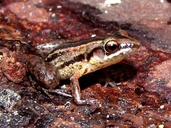|
Description
Eleutherodactylus adelus is a tiny frog, with males reaching only 12 mm and females up to 15 mm in SVL. The skin of the dorsum is tuberculate and has a pair of paravertebral folds at mid-dorsum. The venter is partially areolate, becoming gradually smooth toward chest. The digital discs are very small. There is no webbing between the toes. Vomerine teeth are present, behind the choanae, in a short and arched series (Diaz et al. 2003). This species has a wide longitudinal dark-bordered brown zone on the dorsum, which becomes narrow and pointed toward the snout and is outlined by narrow light stripes. There is a suprainguinal black stripe bordering the light margins of the dorsal zone in the posterior half of the body. Two shallow suprascapular tubercles are present and are frequently light-colored. The flanks are a contrasting light grayish tan, sometimes with a slight green or reddish wash. The supratympanic fold is conspicuously emphasized in black and followed on the flanks by a large black diagonal stripe. Limbs have moderate to faint brown cross bars; the forearms are reddish brown. The belly is greenish or flesh-colored. Sometimes individuals have scattered dots on the throat and belly and the ventral surface of the thighs (Diaz et al. 2003). Distribution and Habitat
Country distribution from AmphibiaWeb's database: Cuba
This species is endemic to Cuba and it is known only from the type locality (Loma del Espejo, Alturas de Pizarras del Sur) in Pinar del Río province, at 130 m above sea level. This is a terrestrial species, found in vegetation and leaf litter in forests of Pinus tropicalis (Diaz et al. 2003). Life History, Abundance, Activity, and Special Behaviors
Males vocalize primarily during the day, although they can also be heard sporadically during night, typically from concealed locations under leaf litter and grass. Calls consist of a series of soft chirps with 3 to 6 notes uttered in complex assemblages; one or two note calls are more sporadic but always precede chirps. The dominant frequency is 4.4-5.4 kHz. This frog is a direct developing species, ovipositing directly on the ground. Clutch size is 3-4 eggs, each measuring 4.7–5.3 mm. Hatchlings measure 3.7–3.8 mm (Diaz et al. 2003). Trends and Threats
The major threat to this species is habitat loss due to fires and clear-cut logging of forests (Hedges and Diaz 2004). Possible reasons for amphibian decline General habitat alteration and loss
Habitat modification from deforestation, or logging related activities
Comments
This species is a member of the subgenus Euhyas (Heinicke et al. 2007). Etymology- The name derives from the Greek word adelos, meaning concealed, in allusion to the secretive habits of this frog, which immediately stops calling when approached (Diaz et al. 2003).
References
Diaz, L. M., Cadiz, A. and Hedges, S. B. (2003). ''A new grass frog from pine forests of Western Cuba, and description of acoustic and pattern variation in Eleutherodactylus varleyi (Amphibia: Leptodactylidae).'' Caribbean Journal of Science, 39(2), 176-188.
Hedges, B. and Díaz, L. M. (2004). Eleutherodactylus adelus. In: IUCN 2007. 2007 IUCN Red List of Threatened Species. http://www.iucnredlist.org/. Downloaded on 10 November 2007.
Heinicke, M. P., Duellman, W. E., Hedges, S. B. (2007). ''Major Caribbean and Central American frog faunas originated by ancient oceanic dispersal.'' Proceedings of the National Academy of Sciences of the United States of America, 104(24), 10092-10097.
Originally submitted by: Ansel Fong G. (first posted 2007-11-07)
Edited by: Kellie Whittaker (2007-11-12)Species Account Citation: AmphibiaWeb 2007 Eleutherodactylus adelus: Cuban Dwarf Grassfrog <https://amphibiaweb.org/species/6218> University of California, Berkeley, CA, USA. Accessed May 27, 2025.
Feedback or comments about this page.
Citation: AmphibiaWeb. 2025. <https://amphibiaweb.org> University of California, Berkeley, CA, USA. Accessed 27 May 2025.
AmphibiaWeb's policy on data use.
| 